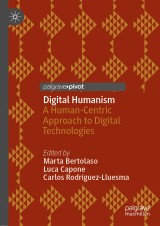Details

Digital Humanism
A Human-Centric Approach to Digital Technologies|
53,49 € |
|
| Verlag: | Palgrave Macmillan |
| Format: | |
| Veröffentl.: | 28.06.2022 |
| ISBN/EAN: | 9783030970543 |
| Sprache: | englisch |
| Anzahl Seiten: | 158 |
Dieses eBook enthält ein Wasserzeichen.
Beschreibungen
This book provides an accessible and up to date overview of the foundational issues about both emerging constructive understandings of the digital era and still hidden and ignored aspects that could instead be dramatically relevant in the future, in the process of a technological humanism. The book offers relevant scientific and ethical questions bringing together professionals and researchers, from different professional and disciplinary fields, who have a shared interest in investigating operative aspects of technological, digital and cultural transitions of humans and their capacity of building human societies. The challenges are clear but there is a lack of an epistemological, anthropological, economic and social agenda that would enable a drive to such transitions towards a technological humanism. <div><br><div><div> This book provides an ideal platform for professionals and scholars, not only providing tools for problem analysis, but also indicating shared directions, needs and objectives for a common goal; the creation of new scenarios instead of the creation of fears and manipulated social imaginaria.</div><div><br></div></div></div>
<p>Chapter 1: Introduction.- Part I – The human factor in AI and digital processes.- Chapter 2: Reflections on a Theory of Artificial Intelligence.- Chapter 3: Digital Metaphysics.- Chapter 4: The Data of the Rose.- Part II – Computability of human problems.- Chapter 5: Experience-Driven Decision Support Systems: The Analytic Hierarchy Process.- Chapter 6: Depression Detection: Text Augmentation for Robustness to Label Noise in Self-reports.- Chapter 7: Artificial Intelligence in the Energy Transition for Solar Photovoltaic Small and Medium-sized Enterprises.- Part III – Governance, regulation and distribution of digital resources.- Chapter 8: Explorations of Legal Ethnosphere: Humans, Environment and Robots.- Chapter 9: Human Rights in the Digital Era: Technological Evolution and a Return to Natural Law.- Chapter 10: The Proposals for a New Legal Framework on AI: Possible Discrepancies between Liability, Compliance, and Duties of Company Directors.- Part IV – Individual e social impacts of digital technologies.- Chapter 11: Education and Artificial Intelligence. A New Perspective.- Chapter 12: Connectivity in the Virtual Office Space: Catalyst or Impediment to TMT Agility? .- Chapter 13: Digital is the New Dimension.</p><br>
Carlos Rodríguez-Lluesma is Professor in the Department of Managing People in Organizations.<p>Prof. Rodriguez-Lluesma holds a Ph.D. in Organizations from Stanford University. He earned a first Ph.D. in philosophy from the University of Navarra and an MBA from IESE Business School. Prof. Rodriguez-Lluesma has held various teaching and research assistantships at Stanford University, and has held the position of lecturer at IESE Business School and the University of Navarra. He has also gathered valuable hands-on experience as a freelance consultant in such industries as financial services, biotechnology, consumer goods and management consulting. He is an advisor to a political consulting start-up in Silicon Valley.</p><p>Marta Bertolaso is Professor of Philosophy of Science at the Faculty of Science and Technology for Humans and the Environment and at the Institute of Philosophy of Scientific and Technological Practice, at University Campus Bio-Medico of Rome (UCBM), Italy. She is the director of the Research Unit of Philosophy of Science and Human Development. She teaches Epistemology of the Experimental Design, Human Ecology & Sustainability, Digital Mindset Transitions. <br></p><p>Luca Capone is currently studying for a PhD in Science and Engineering for Humans and the Environment at the University Campus Bio-Medico of Rome.<br></p><p></p>
This book provides an accessible and up to date overview of the foundational issues about both emerging constructive understandings of the digital era and still hidden and ignored aspects that could instead be dramatically relevant in the future, in the process of a technological humanism. The book offers relevant scientific and ethical questions bringing together professionals and researchers, from different professional and disciplinary fields, who have a shared interest in investigating operative aspects of technological, digital and cultural transitions of humans and their capacity of building human societies. The challenges are clear but there is a lack of an epistemological, anthropological, economic and social agenda that would enable a drive to such transitions towards a technological humanism. <div><br><div><div>This book provides an ideal platform for professionals and scholars, not only providing tools for problem analysis, but also indicating shared directions, needs and objectives for a common goal; the creation of new scenarios instead of the creation of fears and manipulated social imaginaria.</div><div><br></div></div></div><div>Carlos Rodríguez-Lluesma is Professor in the Department of Managing People in Organizations.<p>Prof. Rodriguez-Lluesma holds a Ph.D. in Organizations from Stanford University. He earned a first Ph.D. in philosophy from the University of Navarra and an MBA from IESE Business School. Prof. Rodriguez-Lluesma has held various teaching and research assistantships at Stanford University, and has held the position of lecturer at IESE Business School and the University of Navarra. He has also gathered valuable hands-on experience as a freelance consultant in such industries as financial services, biotechnology, consumer goods and management consulting. He is an advisor to a political consulting start-up in Silicon Valley.</p><p>Marta Bertolaso is Professor of Philosophy of Science at the Faculty of Science and Technology for Humans and the Environment and at the Institute of Philosophy of Scientific and Technological Practice, at University Campus Bio-Medico of Rome (UCBM), Italy. She is the director of the Research Unit of Philosophy of Science and Human Development. She teaches Epistemology of the Experimental Design, Human Ecology & Sustainability, Digital Mindset Transitions. <br></p><p>Luca Capone is currently studying for a PhD in Science and Engineering for Humans and the Environment at the University Campus Bio-Medico of Rome.</p></div>
Offers a heterogeneous perspective on digital ethics Accessible reference for scholars, academics, and practitioners dealing with new digital technologies. Provides a comprehensive and interdisciplinary overview of digital ethics

















